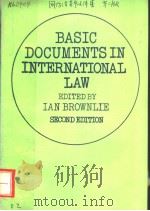《CONTEMPORARY INTERNATIONAL LAW A CONCISE INTERODUCTION SECOND EDITION》
| 作者 | WERNER LEVI 编者 |
|---|---|
| 出版 | WESTVIEW PRESS |
| 参考页数 | 365 |
| 出版时间 | 1991(求助前请核对) 目录预览 |
| ISBN号 | 0813310954 — 求助条款 |
| PDF编号 | 813666428(仅供预览,未存储实际文件) |
| 求助格式 | 扫描PDF(若分多册发行,每次仅能受理1册) |
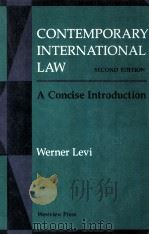
PART 1 THE NATURE AND FUNCTION OF INTERNATIONAL LAW1
1 The Development of International Law6
The Middle Ages,6
The Fifteenth and Sixteenth Centuries,7
The Seventeenth and Eighteenth Centuries,8
Early Writers on International Law,9
The Nineteenth Century,11
2 The Basis and Purpose of International Law14
The Need for Law,14
Law and Politics,14
Is International Law Real Law?16
The Foundation of International Law,17
States and the Foundation of International Law,19
Why Do States Obey International Law?20
3 International Law and Other Law22
Types of Law,22
The Monist and Dualist Views,22
State Practice Regarding Different Types of Law,23
The Act of State Doctrine,26
Political Matters and the Judiciary,28
4 Methods and Principles for Creating International Law30
The Origin,30
Public Policy or Ordre Public,31
Treaties,33
Custom,35
lus Cogens,38
General Principles of Law,39
Equity,40
5Institutions and Persons as Creators of International Law45
States,45
International Organizations,45
Legal Agencies,49
Courts,50
Individuals,50
References and Readings for Part 152
Sociology of Law,52
New States,52
Changing International Society,53
Politics, Power, and Law,54
Theories of Law,55
Binding Force of Law,55
Relations Between International and Municipal Law,56
Conflict Between International and Municipal Law,56
Sources of International Law: General,57
Sources of International Law: Treaties,57
Sources of International Law: Custom,57
Sources of International Law: General Principles,58
Sources of International Law: Equity,58
Sources of International Law: International Organizations,59
Sources of International Law: Individuals,60
Sources of International Law: Courts and Tribunals,60
PART 2 INTERNATIONAL LEGAL CAPACITY61
6Subjects of International Law63
States,63
Recognition,65
Public International Organizations,67
Insurgents and Liberation Movements,69
Corporations,70
Multinational Corporations,72
Individuals,72
References and Readings for Part 275
States,75
Small States,75
Recognition,76
International Organizations,76
Insurgents and Liberation Movements,77
Corporations,77
Individuals,78
PART 3 INHERENT LEGAL QUALITIES OF SUBJECTS79
7 The Status of States80
Sovereignty,80
Equality,82
Nonintervention,84
Sovereign Immunity of States,89
The Trend Regarding Sovereignty,91
8 The Organs of Subjects and Their Protection93
The Problem of Juridic Persons,93
Organs of States,94
Organs of International Organizations,96
Types of Protection,97
The Protected Entities,98
References and Readings for Part 3102
Sovereignty,102
Equality,102
Nonintervention,103
Sovereign Immunity,104
Organs of States,104
Organs of International Organizations,105
PART 4 THE JURISDICTION OF STATES107
9 Temporal Jurisdiction111
The Birth of States,111
The Identity or Continuity of States,112
The Death of States and Succession,113
Types of Succession of States,115
10 Spatial Jurisdiction118
Content of Spatial Jurisdiction,118
Jurisdiction in Airspace,119
Jurisdiction in Outer Space,120
Jurisdiction over Contiguous and Similar Special Zones,121
Jurisdiction in the Exclusive Economic Zone,122
Jurisdiction over the Continental Shelf,122
Jurisdiction on the High Seas,123
Jurisdiction in the Polar Regions,126
Jurisdiction over Ships and Airplanes Outside Territorial Jurisdictions,127
11 Acquisition, Loss, Boundaries,of Spatial Sovereignty and Jurisdiction129
Importance of Land,129
Acquisition Through Natural Events,129
Occupation,130
Prescription,130
Cession,131
Subjugation or Conquest,131
Treaty,131
Loss of Sovereignty and Jurisdiction,132
Land Boundaries,132
Territorial Sea Boundary,133
Continental Shelf Boundary,136
The Exclusive Economic Zone Boundary,136
The Boundary of Space and Outer Space,137
12 Acquisition, Content, Loss,of Personal Jurisdiction139
Meaning of Personal Jurisdiction,139
Acquisition of Personal Jurisdiction,140
Loss of Personal Jurisdiction,141
Personal Jurisdiction over Juridic Persons,142
13 Material Jurisdiction143
Meaning,143
The Limit of Material Jurisdiction,144
The Passive Personality Principle,145
The Protective Principle,146
Universal Material Jurisdiction,147
14 Special Cases of Jurisdiction150
Immunities,150
Armed Forces,151
Aliens,151
Ships,151
Military Activities on the High Seas,153
Pirate Broadcasting,153
Maritime Areas,153
References and Readings for Part 4155
Jurisdiction and Sovereignty,155
Birth and Death of States,155
Succession,156
Content of Spatial Jurisdiction: Air and Space,156
Content of Spatial Jurisdiction: Maritime,157
Jurisdiction: Boundaries,159
Arctic Regions,160
Acquisition and Loss of Spatial Jurisdiction,160
Acquisition and Loss of Personal Jurisdiction,161
Universal Material Jurisdiction,161
PART 5 PERSONS IN INTERNATIONAL LAW163
15 The Law of Aliens166
Admission and Departure,166
The Standard of Treatment and Its Enforcement,168
Aliens as Objects of Municipal Law,172
The Protection of an Alien’s Private Rights,174
The Special Case of Concessions,176
The Special Case of Nationalization,177
The Protection of an Alien’s Personal Rights,178
Extradition and Asylum,178
16 International Law of Nationals and Human Rights181
Beginnings of International Protection,182
The Status of Human Rights,183
Self-Determination of Peoples,185
References and Readings for Part 5189
Individuals: General,189
Alien Natural and Juridic Persons:Diplomatic Protection,189
Denial of Justice,190
Aliens: Private Rights and Expropriation,190
Aliens: Government Contracts and Nationalization,190
Aliens: Personal Rights,191
Aliens: Extradition and Asylum,191
Nationals and Human Rights,191
Self-Determination and Neocolonialism,193
PART 6 INTERNATIONAL ACTIONS WITH LEGAL CONSEQUENCES195
17 Unilateral Transactions198
Nature of Transaction,198
Recognition,199
Notification,199
Declarations,199
Promises,200
Protest,200
Renunciation,200
Interdependent Unilateral Transactions,201
18 Multilateral Actions (Treaties)202
Value of Treaties,202
Nature of Treaties,203
Capacity and Authority to Conclude Treaties,204
Consent,205
Reservations, Amendments, Modifications,206
Object and Purpose,208
Entry into Force,208
Interpretation,209
Termination and Suspension,212
Consequences of Invalidity, Termination, Suspension,214
19 Responsibility of Subjects216
The Principle,216
Controversial Aspects of the Principle,217
The Forms of Injury,220
The Subjects and Objects of Responsibility,221
Responsibility for the Subject’s Organs,222
The Behavior Creating Responsibility,224
Responsibility for Private Persons,224
Conditions Excluding Responsibility,225
Amends,226
Procedure,227
Expanding and Contracting Claims,229
Responsibility of International Organizations,230
References and Readings for Part 6231
General Principles,231
Unilateral Actions,231
Nature of Treaties,231
Capacity and Authority to Conclude Treaties,232
Consent to Treaties,232
Reservations to Treaties,233
Ius Cogens and Treaty Objects,233
Entry into Force of Treaties,233
Interpretation of Treaties,233
Suspension and Termination of Treaties,234
State Responsibility: General,234
Responsibility for Hazardous Action,235
Criminal Liability of States,235
Subjects and Objects of State Liability,235
State Responsibility for Treatment of Aliens,235
Responsibility of International Organizations,236
Special Responsibilities of States,236
PART 7 INTERNATIONAL COOPERATION237
20 Political Cooperation244
Cooperation as a Legal Obligation,244
Differing Views on the Law of Political Cooperation,245
21 Economic Cooperation as a Legal Obligation250
The Roots,250
Development as a Right,253
The Economic Division of the World and the Law,256
22 Environmental Protection261
References and Readings for Part 7267
Political Cooperation,267
Economic Cooperation,267
Economic Development,268
Economic Discrimination,269
Protection of the Environment,269
PART 8 THE PACIFIC SETTLEMENT OF INTERNATIONAL DISPUTES271
23 Applicability of Methods for Pacific Settlement273
Political Versus Legal Methods,273
What Are International Disputes?275
The Choice of Methods,276
24 Settlement Methods Not Involving Decisions by Third Parties278
Negotiation,278
Good Offices,280
Mediation,280
Enquiry,281
Conciliation,282
25 Settlement Methods Involving Decisions by Third Parties283
Arbitration,283
Adjudication,284
References and Readings for Part 8289
Legal Character of Disputes,289
Settlement Methods Not Involving Third-Party Decisions,289
Settlement Methods Involving Third-Party Decisions,290
PART 9 THE USE OF FORCE293
26 Conditions for the Legal Use of Force297
Unilateral (Legally Peaceful) Methods,297
Retorsion,298
Reprisal,298
Self-Defense and Aggression,299
Self-Preservation,304
War,305
27 Regulation of the Application of Force310
General Principles,310
Weapons and Methods,312
Use of Force Short of War,313
28 The Position of Third States Uninvolved in the Use of Force314
In Peacetime,314
In Wartime,315
References and Readings for Part 9318
Legality,318
Reprisal,318
Self-Defense,319
Aggression,319
War, Civil War, Liberation War,320
Humanizing War,320
New Weapons and Technology,322
Neutrality,322
PART 10 THE DYNAMIC CHARACTER OF INTERNATIONAL LAW323
Cases Cited329
Selected Bibliography336
About the Book and Author341
Index342
1991《CONTEMPORARY INTERNATIONAL LAW A CONCISE INTERODUCTION SECOND EDITION》由于是年代较久的资料都绝版了,几乎不可能购买到实物。如果大家为了学习确实需要,可向博主求助其电子版PDF文件(由WERNER LEVI 1991 WESTVIEW PRESS 出版的版本) 。对合法合规的求助,我会当即受理并将下载地址发送给你。
高度相关资料
-
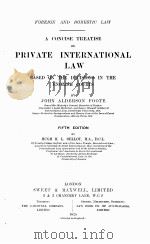
- A CONCISE TREATISE ON PRIVATE INTERNATIONAL LAW FIFTH EDITION
- 1925 THE CARSWELL COMPANY
-

- THE WRITING PROCESS A CONCISE RHETORIC SECOND EDITION
- LETTLE BROWN AND COMPANY
-

- A concise history of the American republic second edition
- 1996 Oxford unviversity
-

- Textbook on International Law Second Edition
- 1993 Blackstone Press Limited
-
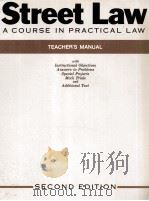
- STREET LAW A COURSE IN PRACTICAL LAW SECOND EDITION
- 1980 WEST PUBLISHING COMPANY
-

- AUSTRALIAN PRIVATE INTERNATIONAL LAW SECOND EDITION
- 1987 THE LAW BOOK COMPANY LIMITED
-

- Tax evasion in Canada
- 1987 Carswell
-

- THE SOCIAL WORKER'S LAW BOOK AN INTRODUCTORY MANUAL
- 1980 MCGRAW-HILL BOOK COMPANY(UK)LIMITED
-

- INTERNATIONAL LAW SECOND EDITION
- 1976 LONDON BUTTERWORTHS
-

- CRIMINOLOGY A CONTEMPORARY HANDBOOK SECOND EDITION
- 1995 WADSWORTH PUBLISHING COMPANY
-

- INTERNATIONAL LAW SECOND EDITION REVISED AND ENLARGED
- 1934 D. APPLETON-CENTURY COMPANY NEW YORK LONDON
-
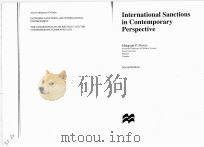
- INTERNATIONAL SANCTIONS IN CONTEMPORARY PERSPECTIVE SECOND EDITION
- 1987 MACMILLAN PRESS LTD
提示:百度云已更名为百度网盘(百度盘),天翼云盘、微盘下载地址……暂未提供。➥ PDF文字可复制化或转WORD
